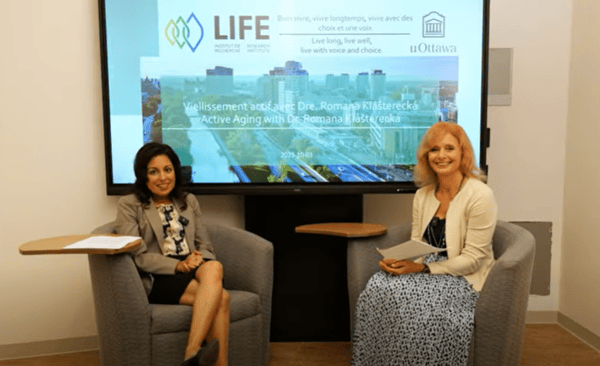The field of aging research is gaining prominence as the global population experiences a gradual...


The field of aging research is gaining prominence as the global population experiences a gradual...

Watch episode 4 of the LIFE Research Institute’s video capsule series, where Dr. Ben Tsang, a...

Watch Episode 1 of the Life Research Institute's video capsule, as it casts the spotlight on an...

Watch the new documentary “Dementia: You Can Make A Difference” by Peabody Award winner Firdaus...
Accessibility for People with Cognitive Accessibility Needs: Taking Steps Toward a More Inclusive World
Watch Episode 2 of the LIFE Research Institute’s video capsule as Dr. Virginie Cobigo and special guest Ms. Mélanie Héroux discuss the implications of a world without cognitive accessibility in mind, why cognitive accessibility is important, and how we can make the world more accessible for people with a variety of cognitive accessibility needs.
Following Disability Pride Month, the director of the LIFE Research Institute, Dr. Nafissa Ismail, met up with the Founder and Director of Open Collaboration for Cognitive Accessibility (Open; OpenAccessibility.ca), Dr. Virginie Cobigo, professor in the Faculty of Social Sciences at the University of Ottawa, as well as special guest Ms. Mélanie Héroux who also works at Open and who has lived experience. Today, they discuss the need for inclusivity in research approaches, and the research Open does to advance cognitive accessibility solutions. At Open, advisors with cognitive disabilities are engaged in the knowledge-creation process.
But why is this research so important?
Dr. Virginie Cobigo strives to use inclusive research methods, especially when involving persons with cognitive disabilities in research and innovation. Research processes and materials are often complex and require major adaptations to be accessible to people with cognitive disabilities.
There is a need to develop innovative research infrastructures to leverage the expertise of academics who successfully work alongside persons with cognitive disabilities and facilitate their meaningful contribution to research. These infrastructures must provide academic and non-academic researchers with the tools and expertise to increase the cognitive accessibility of their processes and methods; they also must foster trust among researchers and persons with cognitive disabilities whom researchers have historically victimized. Mélanie Héroux highlights, “We want to be perceived, and we want to be seen as people first and foremost, and we just want to have the same rights as everyone else.”
So, what are some of the ways things can be made more accessible for people with different cognitive needs?
Dr. Cobigo states that making the world more cognitively accessible is: “…about making the environment easier to navigate and easier to use for people with a variety of cognitive abilities.”
Which can include:
Dr. Cobigo explains that cognitive accessibility needs affect a large portion of the population. People who experience cognitive accessibility needs may be people with learning disabilities or attention deficit disorder. It can also include people who experience cognitive difficulties due to a head injury or a stroke, as well as people who experience some level of cognitive decline as they age.
If you're as inspired by this discussion as we are, check out the full video on the LIFE Research Institute's YouTube channel. And remember, every step we take toward cognitive accessibility brings us closer to a more inclusive world.
By LIFE Research Institute
Ageing begins at birth and is our response to the multitude of factors and influences faced throughout our life trajectories. The LIFE Research Institute assembles researchers and partners with diverse perspectives who work collaboratively to understand how we are guided along the unexpected trajectories of life. We expect this knowledge will transform how we view the roles for individuals and society in ageing and create new opportunities for life fulfillment and well-being. We want to inspire individuals to live the longest, best lives possible honouring the many varied choices along the way.Also Read